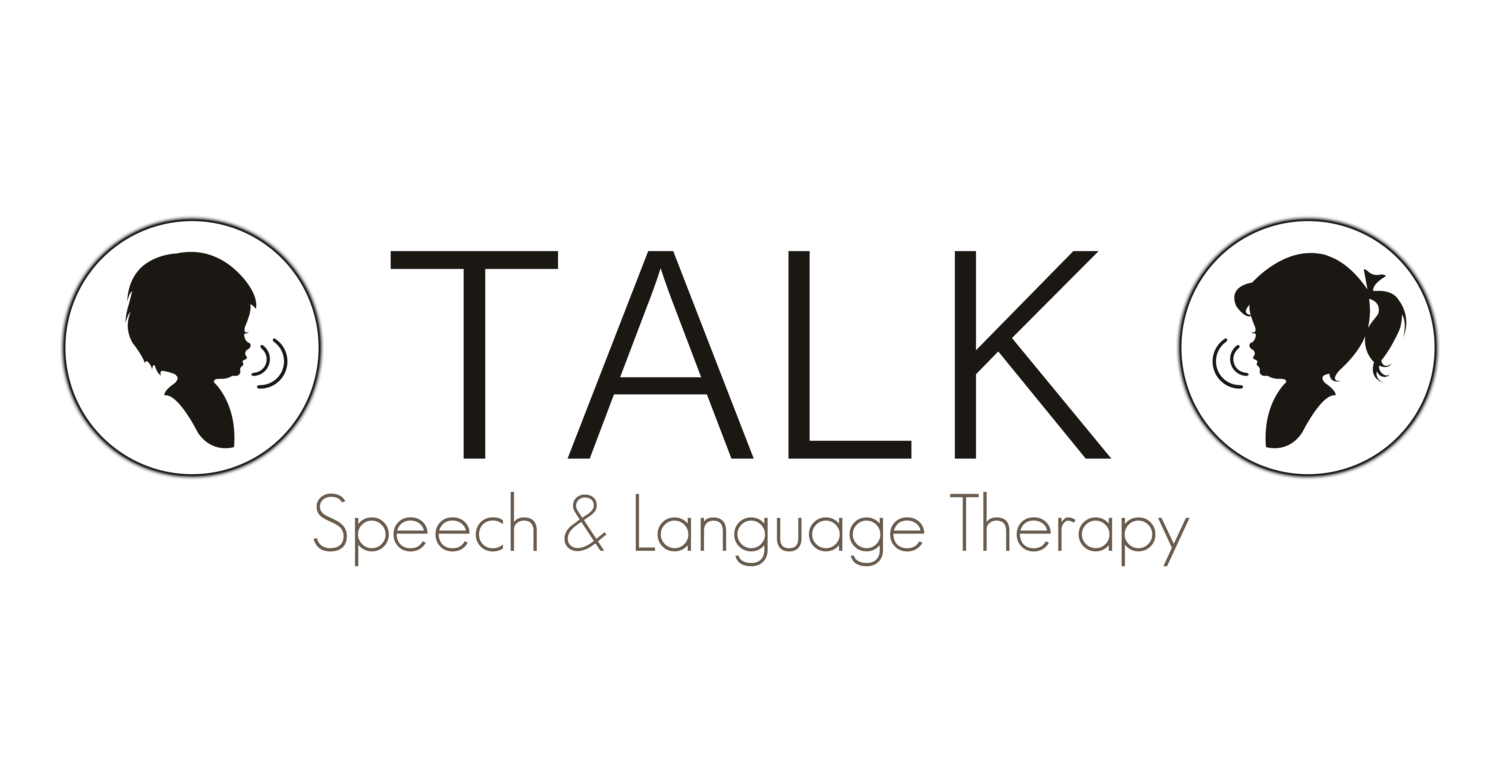
Areas of Focus: With over 20 years of experience in the field of Speech-Language Therapy, TALK offers the most current therapy, backed by the most current research, for delays and disorders in the following areas:
Services

-

SIGN LANGUAGE
Early Childhood Sign Language is a wonderful way to accelerate your child's language development. We start with children as young as 8 months old and begin laying the scaffolding to a lifetime of strong speech and language skills.
Babies that can sign experience less frustration because they can communicate their needs with confidence. Signing with your baby is also a great bonding experience, enabling the entire family to engage in this precious and fleeting period of life.
-

CHILDHOOD APRAXIA
Childhood Apraxia of Speech is TALK's area of expertise. Heather Hamilton, Owner of TALK has spent years pursuing additional training in how best to remediate this disorder in children.
While expert training in specific apraxia treatment is crucial, a child's success in apraxia therapy is profoundly impacted by their family's understanding of the disorder and their direct support of the child who is struggling to communicate. The core philosophy of TALK is to engage families in the process of speech therapy in a way that works. The combination of TALK's therapy expertise, setting and philosophy is the combination of elements your child needs for success.
-

RECEPTIVE LANGUAGE
Receptive Language is a child's ability to understand what is said to them. Some signs that your child may be having difficulty with receptive language or processing include:
Difficulty following one-step or multi-step directions
Not answering questions, or responding with yes/no instead of a meaningful answer
Repeating part of what you say
Understanding single word or short
sentences but not longer age-appropriate sentences
-

EXPRESSIVE LANGUAGE
Expressive Language refers to how you use language to communicate thoughts, ideas, and needs. Expressive language is using words, grammar, and sentence structure to communicate. It does not refer to how words are produced by the mouth (e.g. sound errors). A child with an expressive language delay may:
Only using single words or shorter sentences than are age appropriate
Have errors of grammar (e.g. incorrect word endings, incorrect word order, leaving words out of a sentence)
Get easily frustrated when trying to communicate or rely heavily on gestures and showing things instead of using spoken language
Have a small vocabulary relative to peers
Not be using words by 12-18 months of age
Not be combining words by 24 months of age
-

ARTICULATION
This refers to the way sounds are produced by the mouth. Children can have a mild speech delay that impacts their ability to say one or two sounds, or a more severe delay or disorder that effects many sounds. All children have sound errors in their speech as they are developing. However, it is expected that sounds will be mastered by a certain age. It might be worthwhile to have TALK screen or evaluate your child if:
Their speech is unclear to others
People have a hard time understanding them on the phone
They are becoming frustrated with speaking because they are frequently not understood
You are noticing none of their peers have the same sound errors
With older children if their spoken speech sound error(s) show up in writing (e.g., If your child says w instead of r they may also spell words with w in the place of r. An example would be wed instead of red.)
-

Dyslexia
Dyslexia is a language-based learning disability. As Speech-Language Pathologists with specialized training, the therapists at TALK Speech & Language Therapy, LLC are uniquely qualified to provide critical diagnostic information and intervention services for struggling readers.
Dyslexia refers to a cluster of symptoms, that results in people having difficulties with specific language skills, particularly reading. Students with dyslexia often experience difficulties with both oral and written language skills. They can struggle with the perception of sounds in words, pronouncing words, and writing. Dyslexia is referred to as a learning disability because dyslexia can make it very difficult for a student to succeed without phonics-based reading instruction that is unavailable in most public schools.
Individuals with dyslexia can learn to read. If children who have dyslexia receive effective phonological awareness and phonics training, they will have significantly fewer problems in learning to read. Early intervention is a factor and it is not too early to start on literacy skills with very young children. Critical skill development occurs before the end of 1st grade. It is never too late for individuals with dyslexia to learn to read, process, and express information more efficiently. Research shows that programs utilizing Structured Literacy instructional techniques can help children and adults learn to read. https://dyslexiaida.org/
Dyslexia affects as many as one in five children. It is characterized by difficulties with word recognition, spelling, and decoding. These challenges significantly impact reading comprehension, vocabulary growth, and overall academic achievement.
Common Characteristics of Dyslexia include:
Difficulty with rhyming, blending sounds, learning the alphabet, linking letters with sounds
Difficulty learning rules for spelling
Spelling words the way they sound (e.g., min for mine)
Using letter name to code a sound (e.g., rt for art)
Difficulty remembering “little” words (e.g., the, of)
Comprehension of independently text
Being a reluctant reader
Slow, word-by-word reading and not using correct “storytelling” intonation
Difficulty with words in lists, nonsense words and words not in their listening vocabulary
Poor spelling - leaving out sounds, adding or leaving out letters or syllables
Slow, poor quality writing
When speaking, may have a tendency to mispronounce common words (floormat for format)
Difficulty using or comprehending more complex grammatical structures
Weak vocabulary knowledge and use
Additional difficulties that may be present include proofreading and copying, poor or slow handwriting, memorizing and retrieving math facts, and doing math operations correctly
As highly trained Speech-Language Pathologists we provide direct intervention in the areas of:
Preventing language, written language and literacy problems by fostering language development and early literacy skills
Identifying children at risk for reading and writing problems
Performing critical elements of dyslexia testing
Providing intervention and documentation for reading, language, and writing
Providing assistance to general education teachers, parents, and students
Advocating for our clients with schools
-

EXECUTIVE FUNCTION
Executive Function refers to a set of mental skills that impact a person's ability to organize and regulate. Challenges with executive function include difficulty with:
Inhibiting actions
Restraining or delaying responses
Selectively attending
Setting goals
Planning
Organizing
Completing tasks
Switching focus
Memory
When an individual has issues with executive function any task that requires planning, organization, time management, memory or flexible thinking can be quite difficult. Individuals with executive function disorder struggle to:
Analyze a task and assess what needs to be done
Plan how to handle the task
Break down the steps necessary to complete a task
Determine the time needed to complete a task
Gather necessary materials for a task
Initiate
Follow a plan to complete a task
Adhere to time constrains
Complete a task
TALK is specially trained to address executive function challenges.
-

PHONOLOGICAL AWARENESS SKILL DEFICITS AND READING DISORDERS
Speech-Language Pathologists are critical in helping to remediate Phonological Awareness Skill Deficits and Reading Disorders
Phonological Awareness is a set of skills that typically develop during preschool and kindergarten.They relate to a child's awareness of sounds in a language. Children need to be able to hear the individual sounds in words, break them down and manipulate them. Examples include rhyming, blending and deleting sounds from words. It is CRITICAL that your child's Phonological Awareness skills are targeted directly if your child has a history of speech sound production delays or if they are exhibiting delays in acquiring any pre-reading skills. Early intervention in this area will prevent reading, spelling and written language delays in your child's future.
Reading Disorders: There are fundamental connections between spoken and written language. It is critical that intervention for language disorders target written as well as spoken language needs. As with difficulty in learning to listen and speak, difficulty in learning to read and write can involve any of the components of language (i.e., phonology, morphology, syntax, semantics, and pragmatics). Children and adults may have difficulty with the production, comprehension, and awareness of language at the sound, syllable, word, sentence, and discourse levels. Reading and writing problems also may lead to difficulties using language strategically to communicate, think, and learn.
TALK has special training in literacy assessment and intervention.
-

OTHER DISORDERS
Other disorders that TALK treats include, but are not limited to:
If you or your child frequently repeat sounds or words when speaking it may be a Stuttering Disorder.
Children and adults with a hoarse voice, that is not secondary to a cold or allergies, may have a Voice Disorder.

FOR ADULTS
TALK is pleased to offer accent reduction services, both in office and virtually, to professionals looking to enhance their career. Our offices are uniquely designed to create a quiet, private setting to discerning clients with high standards and expectations. We are "Compton PESL Accent Modification Method" certified.
links
Written Language Disorder: https://www.asha.org/PRPSpecificTopic.aspx?folderid=8589942549§ion=Overview
ASHA milestones: https://www.asha.org/public/speech/development/chart/


